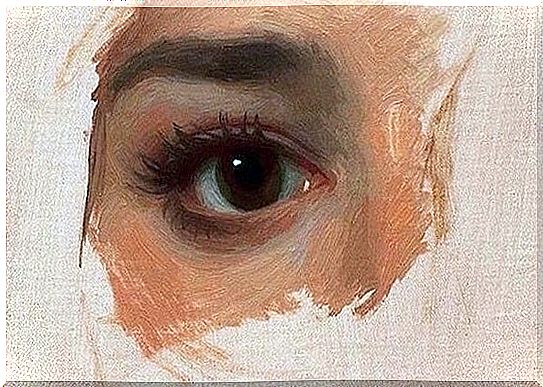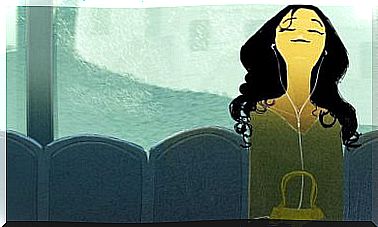Floating Anxiety: The Void Where All My Fears And Uncertainties Live

I’m not afraid of anything in particular, but in reality… everything scares me. Because floating anxiety, that’s it; it is the uncertainty which lurks and catches me, which prevents me from breathing and which robs me of my desire to leave my home. It’s like living alone in a room without windows, it’s like getting used to perpetually in the shell of my worries, in the suffocating ball of my irremediable despair …
As Virginia Woolf said in her diaries, life is a dream, but it’s waking up that kills us. It is as if in a certain way, there came a specific moment in our life when we had to “wake up”, open our eyes to the responsibilities, to the charges, to the unstoppable movement of our cities, to this sometimes out of tune sound of relationships. human … So, almost without realizing it, we perceive that all this movement not only exceeds us, but makes us smaller.
Waking up to find that sometimes life hurts and is difficult is something that thousands of people experience, without a doubt. However, there is something far more complex that thousands of men and women experience on a daily basis. It is a diffuse, shapeless fear of being caught in a behavioral pattern of excessive and recurring worry about almost everything, about almost every event.
Thus, this emotional scenario where only chronic uncertainty and constant stress grows, gives shape to a clinical manifestation known as “floating free anxiety” and which in turn is part of Anxiety Disorder. Generalized (TAG). It must also be said that we are faced with a reality as worn out as it is complex, since unlike other disorders, worry and reactions do not focus on a series of specific aspects, but concern everything.
Generalized Anxiety Disorder could be summed up in one simple and blunt sentence: “I always think of something bad that could happen to me”.
Adrien is 35 years old, and after 10 years of relationship, his partner has just left him. She has fallen in love with someone else, and while our protagonist on the surface seems to be doing well, there are some notable aspects to those closest to her. While it is true that Adrien has always been a little anxious, since the breakup he is excessively obsessed with different things, one of them being the health of his parents: he fears that they will fall ill and not die.
In addition, his co-workers also noticed some details. Adrien is an architect, and for some time now he has started to obsess over the idea of making a mistake. He is excessively worried about doing his job well and that something bad will happen under his responsibility. He also fears that he will not be able to pay his mortgage, hence the fact that he is already anticipating what issues he should consider taking if such a thing happens. However, none of this ever happened.
If we took the example of this imaginary man, it is for a very concrete reason. Generalized Anxiety Disorder, and in essence that floating fear that permeates almost every aspect of these patients’ lives, is believed to affect women in large part. However, the news also tells us something very important: almost 60% of those affected do not receive treatment or do not dare to seek help, most of these people being men.

To understand a little better this disorder, and in essence, this clinical manifestation that is floating anxiety, we must first understand what function fear has in our life: prepare to react to a “real” threat, is a refined and exceptional adaptive mechanism that allows us to survive. However, what happens when this experienced fear is not a real threat?
And more… What if there comes a time when this fear, this anguish permeates every point of our life? What will happen is that we will remain stranded in a parallel dimension worthy of the worst nightmare. Because there is nothing worse than living in fear.
Many scientists and neuro-psychiatrists know it well: GAD is a syndrome different from others. So, according to researchers at Stanford University School of Medicine, this floating anxiety is due to a dysfunction in different parts of the brain, one of them being the amygdala.
Let’s not forget that the amygdala, this small structure the size of an almond, measures our emotions, our memory and our perception of fear. At a given moment, and for reasons which we do not know, the circuits which shape this refined brain region are altered, and with them, the order and the balance of our life.
As always happens in the treatment of anxiety, two approaches are needed when addressing this clinical condition. Medication, on the other hand, reduces symptoms and in turn sets the conditions for psychotherapy to be much more effective.
Usually, drugs based on the selective inhibition of serotonin re-uptake are used. However, in many cases the administration of certain anti-depressants is also necessary (remember that each patient is unique and their personal reality will require exclusive treatment).

On the other hand, cognitive behavioral therapy and all these stress management based therapies are very effective in reducing those excessive worries brought on by floating anxiety. Thanks to them, we will learn effective coping strategies and we will develop healthier behaviors.
To conclude, it should also be pointed out that it is important to take an interest in other aspects of our life: having a balanced diet and practicing a sport or any meditation technique whatsoever are also complementary tools that can help us. allow us to overcome fear and to focus our attention a little better on what is important, on what is essential, and thus to learn to think correctly in order to live better.
Images by Agnès Cecile









